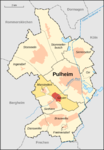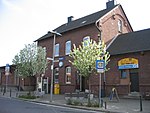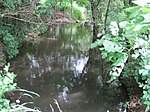Brauweiler
Cologne region geography stubsFormer municipalities in North Rhine-WestphaliaRhein-Erft-Kreis

Brauweiler is a part of Pulheim, west of Cologne, North Rhine-Westphalia in Germany. The former Benedictine abbey, Brauweiler Abbey, founded 1024, is used today by the Rhein Department for the Care of Historic Monuments. In Brauweiler in the 1920s a large power transmission station was built, which supplied up to 380 kV. It was also the starting point of the north south powerline. Also in the area of this transformer station is the main control room of the RWE, from which nearly the entire high-voltage transmission system of the RWE AG is supervised by remote control. This control is also used to coordinate the power transmission in continental Europe.
Excerpt from the Wikipedia article Brauweiler (License: CC BY-SA 3.0, Authors, Images).Brauweiler
August-Bebel-Straße,
Geographical coordinates (GPS) Address Nearby Places Show on map
Geographical coordinates (GPS)
| Latitude | Longitude |
|---|---|
| N 50.966666666667 ° | E 6.7833333333333 ° |
Address
August-Bebel-Straße 90
50259
North Rhine-Westphalia, Germany
Open on Google Maps









